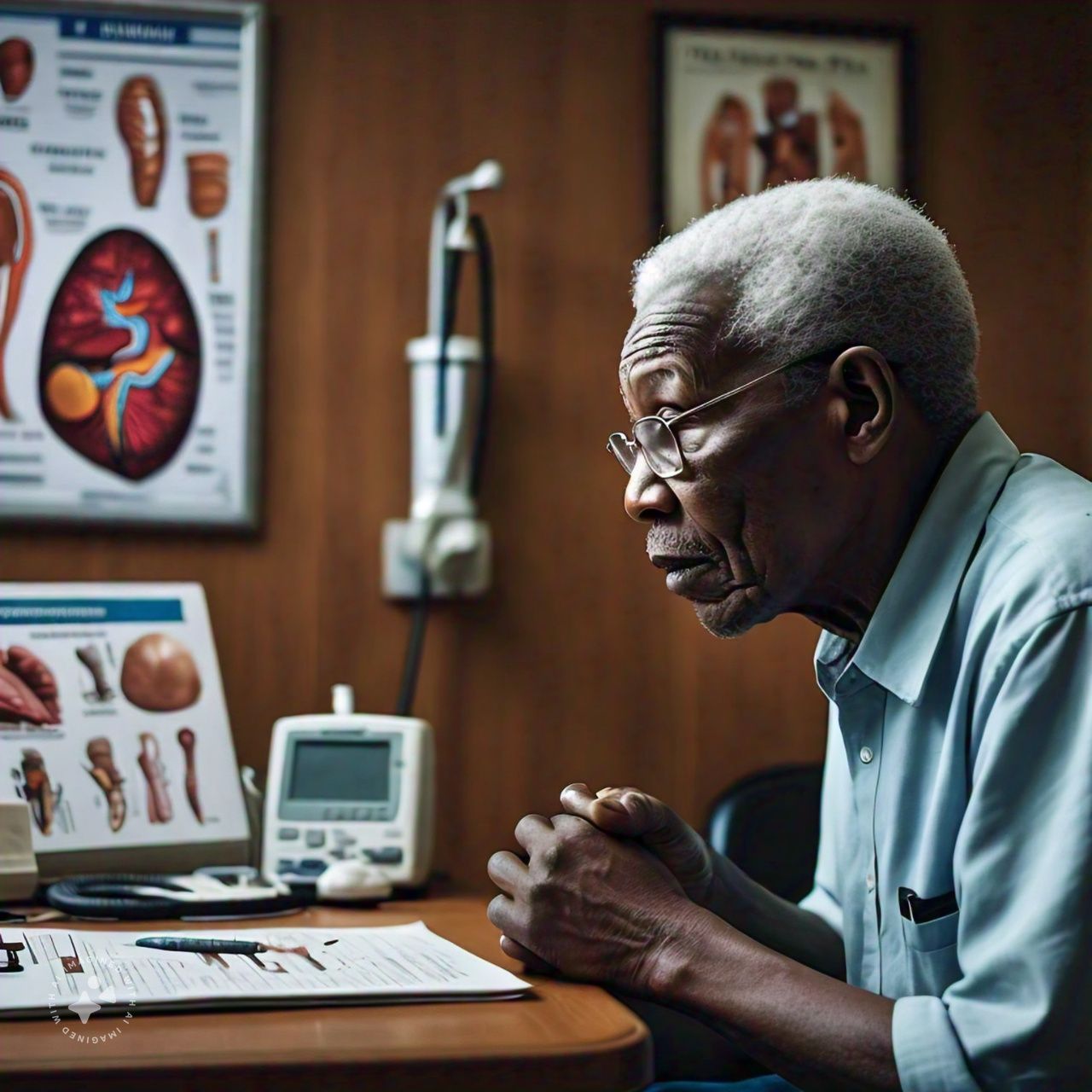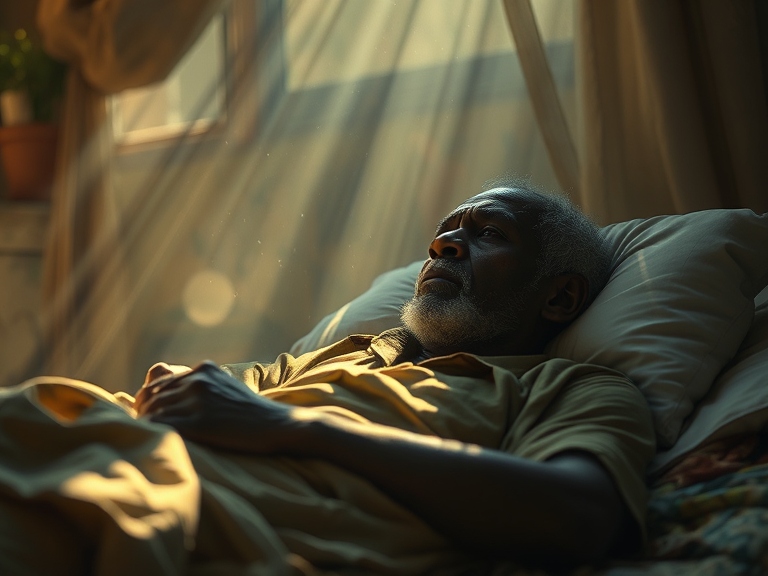
Oluchi slowly guided her father, Chief Obiora, into the house. His steps were more laboured now, each one a painful reminder of the kidney disease that had gradually taken over his once-strong body. She had grown up watching him, a man of boundless energy who could work from sunrise to sunset on the farm. But now, he could barely walk without pausing to catch his breath.
Oluchi helped him settle into his favourite chair, the same one he had claimed years ago when his body was full of strength. His once firm hands trembled slightly as he reached for the glass of water she placed on a side stool beside him. She bit her lip, thinking of the dialysis treatments, the strict fluid restrictions, and the constant fear that weighed heavily on her heart. Every doctor’s visit seemed to chip away at her hope, leaving her with more questions than answers.
She looked at him, and her thoughts softened. Chief Obiora had always been a fighter. His eyes, though tired, still carried the warmth and humour she had known all her life. He caught her gaze and smiled weakly, “It’ll be alright, my daughter. I’ve lived a long life, and I’m still here.”
Oluchi swallowed the lump in her throat and nodded, knowing he was right. His strength wasn’t in his body anymore but in his spirit. She promised to cherish every moment and make his days comfortable. The disease had taken much, but it couldn’t take away the love that filled their small home.
As the evening breeze blew gently through the window, Oluchi sat beside him, quietly grateful for another day with her father. Every moment, every breath he took, was a blessing.
Kidney disease is quite common among seniors, affecting over 25% of older adults. While there’s no cure yet, early detection and treatment can prevent severe complications like kidney failure. Chief Obiora’s experience reminds us how crucial regular checkups are. In this blog, we’ll walk you through the early signs of kidney disease and share helpful treatment options.
What is Kidney Disease?
Kidney disease happens when the kidneys slowly stop working properly and can’t filter out waste and extra fluids from the blood. This causes toxins to build up in the body, harming important organs like the heart, lungs, and brain. The most common type is called chronic kidney disease (CKD), which usually develops over several months or years, depending on how well it’s managed.
If kidney disease isn’t controlled, it can get worse and lead to kidney failure, where the kidneys stop working altogether. At this point, people often need dialysis, a treatment that helps filter the blood, or, in more severe cases, a kidney transplant. Not treating kidney disease can also cause other serious problems like heart disease, stroke, or even death.
It’s really important to take care of your kidneys and watch for warning signs of kidney damage.
Signs of Kidney Disease
Early detection is key when it comes to kidney disease. Here are some common signs to watch out for:
- Fatigue and Weakness: When the kidneys can’t filter waste properly, toxins can build up in the bloodstream, leading to extreme tiredness and a general sense of weakness. This can drain your energy, making even small tasks feel overwhelming.
- Swelling in Feet and Ankles: Swelling in your ankles, feet, or even around your eyes could be a sign of kidney problems. This swelling, known as oedema, happens because the kidneys struggle to remove the excess bodily fluid.
- Irregular Urination: Damaged kidneys may affect how often or how much a senior urinates. Sometimes, they may pee more or less than usual and wake up frequently at night to use the bathroom.
- Coloured Urine: Seniors may notice a change in their urine colour, turning from yellow to brown or red. This happens because damaged kidneys may let blood cells leak into the urine.
- Shortness of Breath: Fluid can build up in the lungs, making breathing hard, especially when doing activities or even lying down. Additionally, anaemia from kidney dysfunction can contribute to feelings of breathlessness.
- Nausea and Vomiting: When waste builds up in the blood, it can cause vomiting, nausea, and loss of appetite. Seniors might feel full quickly, which makes it hard for them to get the nutrients they need.
- High Blood Pressure: The kidneys help control blood pressure. When they’re not working correctly, it can lead to high blood pressure, which can also worsen kidney disease.
- Itchy Skin: Poor kidney function can cause imbalances in minerals and nutrients, which can lead to dry, itchy skin. This can be very uncomfortable for seniors, especially at night, and might disrupt their sleep.
- Muscle Cramps: A lack of important minerals like calcium or potassium can cause painful muscle cramps, usually in the legs. These cramps can happen suddenly, making it hard for seniors to move around.
- Confusion or Difficulty Concentrating: Kidney failure can lead to the brain not getting enough oxygen, affecting the senior’s cognitive function. This can cause confusion, difficulty concentrating, and memory problems. This cognitive decline can make things very difficult for the older adult and their loved ones.
- Metallic Taste in the Mouth: Kidney disease can lead to uremia, where waste builds up in the blood, resulting in a metallic taste or bad breath. This can even affect the appetite and food choices of the seniors, making it hard for them to maintain proper nutrition.
How to Treat Kidney Disease
Although kidney disease can’t be cured, some treatments can help slow it down and manage the symptoms:
- Medications: Doctors might give medicines to control conditions like high blood pressure and diabetes, which can worsen kidney disease. These medicines help protect the kidneys from more damage.
- Diet and Lifestyle Changes: People with kidney disease should follow a special diet low in salt, potassium, and phosphorus. Drinking enough water and eating healthy foods is important. Eating less protein may also help reduce the stress on the kidneys.
- Dialysis: If the senior has severe kidney disease or kidney failure, their doctor might recommend dialysis. This process filters waste from the blood, working like an artificial kidney. Dialysis can be done at home or in a hospital.
- Kidney Transplant: For some older adults, a doctor may recommend a kidney transplant. Apart from donors sometimes being hard to find, organ transplants are highly risky treatments. This is because the recipient must live with any long-term consequences, including any health implications resulting from the transplant.
- Regular Checkups: Older patients need regular doctor visits to track their kidney health and adjust treatments.
Conclusion
Kidney disease is a severe condition that needs careful attention, especially for older people. Recognising early symptoms and acting quickly can help slow down the disease and improve the person’s life. Treatments like medicine and lifestyle changes can make a big difference.
Disclaimer: This blog is for informational purposes only and not a substitute for professional medical advice. Always consult your healthcare provider for personalised recommendations based on your health needs.
At @Ìtọ́jú, we have expert medical personnel who are trained and experienced in handling seniors with various ailments. You can be assured that your senior will be in good hands. For expert advice and compassionate care, @Ìtọ́jú is here to support you. Reach out to us today.



